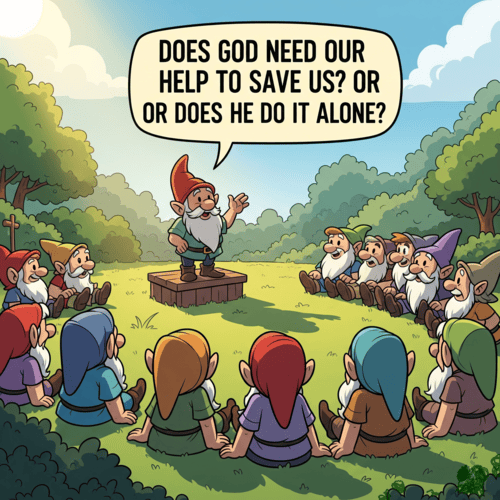Did Methuselah Live 969 Years? Can the Bible be Trusted?
When the Bible states Methuselah lived for 969 years (Genesis 5:27), modern readers tend to question the reliability of Scripture. In our world, where reaching 100 is considered remarkable, longevity claims of nearly a millennium seem more like myth than history. But is the scepticism warranted? Let’s examine the evidence and strongest arguments supporting the possibility of these extraordinary biblical lifespans.
UNDERSTANDING BIBLICAL LONGEVITY
Genesis records several pre-flood (antediluvian) figures living extraordinarily long lives: Adam (930 years), Seth (912 years), and Methuselah topping the list at 969 years. After the flood, a distinct pattern emerges—lifespans gradually decline over successive generations until reaching what we would consider normal human lifespans by the time of Abraham and Moses.
The pattern doesn’t appear random or arbitrary. Instead, it suggests a deliberate documentation of a changing reality—not the kind of inconsistency we’d expect from fictional accounts.
SCIENTIFIC CONSIDERATIONS SUPPORTING BIBLICAL LONGEVITY
Environmental Differences: Recent scientific findings lend credibility to the possibility of different longevity conditions in the ancient world:
Atmospheric Composition: Research suggests the pre-flood world may have had significantly higher oxygen levels and enhanced atmospheric protection from harmful radiation. Studies at the Earth’s poles have found air bubbles trapped in ice that indicate different atmospheric conditions in ancient times, including higher oxygen content.
The Vapour Canopy Theory: Some creation scientists propose a water vapour canopy once surrounded Earth (referenced in Genesis 1:6-7), potentially filtering out harmful radiation and creating optimal conditions for cellular longevity.
Genetic Purity: Dr. John Sanford’s research on genetic entropy suggests early human beings, closer to creation, would have had fewer genetic mutations and defects, potentially allowing for extended lifespans before cumulative mutations began degrading the human genome.
Modern Longevity Research: Recent breakthroughs in ageing research support the theoretical possibility of extreme longevity:
- Harvard researchers have successfully reversed ageing in mice by reprogramming cells
- Studies on telomere preservation show promising results for extending cellular lifespans
- Research into organisms like the immortal jellyfish (Turritopsis dohrnii) demonstrates biological immortality is possible in nature
HISTORICAL CORROBORATION
The Bible isn’t alone in recording exceptional human longevity in ancient times:
- The Sumerian King List records pre-flood rulers reigning for thousands of years
- Ancient Egyptian and Babylonian texts contain similar accounts of diminishing lifespans
- The Greek historian Josephus defended the plausibility of biblical lifespans, noting ancient historians from multiple cultures recorded similar phenomena
Dr Bryant Wood, archaeologist and director of Associates for Biblical Research, notes these parallel accounts suggest “a common cultural memory of extraordinary human longevity rather than independent fictional creations.”
CONCLUSION: DID METHUSELAH LIVE 969 YEARS?
The biblical account of Methuselah’s 969-year lifespan, while certainly extraordinary, isn’t as scientifically implausible as many assume. When we consider the biblical pattern of declining lifespans, potential environmental differences in the ancient world, corroborating cultural accounts, and recent scientific research on ageing, we find reasonable grounds to take the biblical record seriously.
If the Bible proves trustworthy in areas where we can test it historically and archaeologically (as it repeatedly has), perhaps we should extend that trust to areas beyond our immediate verification. The question of ancient longevity ultimately invites us to consider whether our modern assumptions about what’s “possible” should limit our acceptance of an ancient text that has consistently demonstrated its reliability.
DID METHUSELAH LIVE 969 YEARS? RELATED FAQs
Why would God allow humans to live so long before the flood but not today? Many theologians believe the gradual reduction in lifespan was part of God’s judgement on sin, as explicitly mentioned in Genesis 6:3. The change may have served multiple purposes: limiting the accumulated impact of human wickedness, increasing dependence on God through shorter lives, and creating urgency in fulfilling God’s purposes.
- If ancient human beings lived so long, why don’t we find extremely old human fossils? Fossilisation is an extremely rare process that requires specific conditions, and a long lifespan wouldn’t necessarily change bone structure in ways detectable in fossil remains. Additionally, the flood described in Genesis would have significantly disrupted burial sites and remains from the pre-flood world. The age of human remains is typically estimated using dating methods that operate under assumptions about decay rates that many creationists question, making this absence of evidence not necessarily evidence of absence.
- How did ancient people track such precise ages without modern calendars? Ancient civilisations were remarkably sophisticated in astronomical observations and time tracking, with evidence of calendar systems dating back to earliest human history. Many ancient cultures, including those contemporary with biblical figures, developed precise lunar and solar calendars and carefully documented genealogies and lifespans. The detailed recording of ages (like Methuselah’s specific 969 years rather than a rounded 970) actually strengthens the case for historical recording rather than symbolic numbers.
Did other descendants of Adam and Eve also live extraordinarily long lives, or just those mentioned in the Bible? The Bible primarily records the lifespans of individuals in the messianic line leading to Noah and eventually to Christ, but suggests long life was common for all pre-flood people. Genesis 6:3 indicates God’s decision to limit human lifespan to 120 years was a universal decree, implying extended longevity was previously the norm for all humans.
- How would such long lives have affected ancient society, family structures, and knowledge accumulation? With lifespans approaching a millennium, pre-flood civilisations would have experienced unprecedented knowledge retention and transfer, with multiple generations living simultaneously. Adam himself would have been alive during most of Methuselah’s lifetime, allowing for direct transmission of creation knowledge across many generations. Family structures would have been exponentially more complex than today, with potentially hundreds of generations of descendants alive simultaneously, perhaps explaining the advanced civilisations that archaeology increasingly suggests existed in deep antiquity.
- If these long lifespans were literal, why don’t other historical records outside the Near East mention similarly long-lived individuals? While the Bible provides the most detailed account of antediluvian longevity, similar traditions appear across numerous ancient cultures globally. The Sumerian King List records rulers reigning for thousands of years, ancient Chinese texts mention emperors living for centuries, and various indigenous traditions worldwide contain accounts of ancestors with exceptionally long lives.
How might extended longevity have affected brain development and intelligence in pre-flood people? With lifespans nearly ten times our current average, pre-flood human beings would have had unprecedented time for learning, skill development, and knowledge accumulation. Recent neuroscience research shows that neural connections continue developing throughout life, suggesting ancient humans may have achieved cognitive capacities exceeding our modern understanding.
DID METHUSELAH LIVE 969 YEARS? OUR RELATED POSTS
Editor’s Pick

Testament to Design: The Engineering Marvel of Elephants
Picture an African elephant delicately plucking a single acacia leaf with the tip of its trunk, then moments later using [...]

Blue Whales: Mammoth Icons of Intelligent Design
Imagine an animal so massive its heart alone weighs as much as a small car, yet so precisely engineered it [...]

Do Unbelieving Kids Disqualify Church Leaders?
REFORMED PERSPECTIVES ON 1 TIMOTHY 3 AND ELDER QUALIFICATIONS Every pastor knows the heartbreak. A faithful elder who has served [...]

Why Did God Kill Onan? Wasn’t the Punishment Disproportionate?
The story of Onan in Genesis 38 troubles many. Why would God strike down a man for what seems like [...]

Is God Preparing Me for Ministry? How May I Know for Sure?
The question haunts many faithful believers. You’re serving faithfully in your local church, perhaps teaching Sunday school or leading a [...]

Ephesians 1:13: Was the Spirit’s Indwelling Promised of Old?
When Paul declares believers are “sealed with the promised Holy Spirit” in Ephesians 1:13, one word jumps off the page: [...]

Monergism vs Synergism: Is Salvation God’s Work Alone?
When God saves us, does He do it alone, or does He need our help? The question isn’t mere theological [...]

Was Jesus Abandoned by the Father on the Cross?
WHY WE ANSWER IN THE NEGATIVE “My God, my God, why have you forsaken me?” These words from the cross [...]

Why Do Some Respond to God’s Call While Others Don’t?
THE REFORMED VIEW ON OUTWARD AND INWARD CALLS EXPLAINED Picture this: Two neighbours attend the same church service. They hear [...]

Does Ocean Salt Content Prove a Young Earth?
A COMPELLING LOOK AT MARINE CHEMISTRY AND EARTH’S TIMELINE The Salt Question That Challenges Deep Time: If Earth’s oceans have [...]





